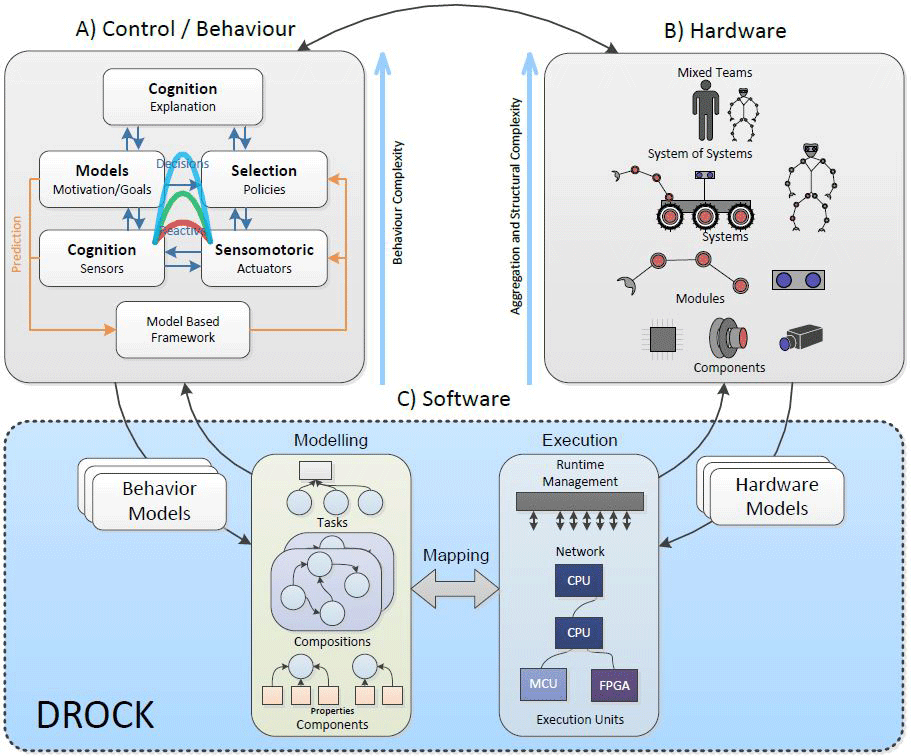D-Rock
Models, methods and tools for the model based software development of robots

Robots for manipulation and handling are becoming increasingly widespread in work and living environments, thanks to their improved capabilities. In order to meet even the most demanding tasks in different fields of application even more complex systems will be needed. A major challenge in robotics is to develop systems efficiently and cost effectively, which are able to deal with this complexity in a robust manner. Software plays a decisive role in the complexity of these systems. The project D-Rock is concerned with tools and methods for developing software for robots. The concepts of modularization and modeling are used to make the process manageable. While modularization enables efficient reuse of components, modeling describes how these components can be used in a given context.
| Duration: | 01.06.2015 till 31.05.2018 |
| Donee: | German Research Center for Artificial Intelligence GmbH |
| Sponsor: |
Federal Ministry of Education and Research
German Aerospace Center e.V. |
| Grant number: | Funded by the Federal Ministry of Education and Research. Grant No 01IW15001. |
| Application Field: |
Logistics, Production and Consumer
SAR- & Security Robotics Underwater Robotics Space Robotics |
| Related Projects: |
LIMES
Learning Intelligent Motions for Kinematically Complex Robots for Exploration in Space
(05.2012-
04.2016)
|
| Related Software: |
Bagel
Biologically inspired Graph-Based Language
|
Project details
The prime focus of this project is the aspect of model based software development in the context of mobile manipulation systems. The modelling comprises software, hardware and behavior of the systems. Behavior is mapped onto software, and software is mapped onto hardware. At run-time the system state is aligned with the models, to allow monitoring and dynamic system reconfiguration. A robot developed in this way is able to react with more flexibility to unforeseen events.
The goal of the D-Rock project is the design and implementation of a framework and tools for the programming of robots. This goal can be split into the following aspects:
Modeling
A unified modeling of the tasks and behaviors, the software components and the executions units of the robot.
Mapping
Finding robotics specific strategies to efficiently map behavior models to software components, and software to heterogeneous networks of execution units.
Execution
Execution and monitoring of networks of software components which can be reconfigured at run-time.
Tools
Development of tools for the generation and verification of models, and their mapping to processes and handling of dynamic reconfiguration.
Evaluation
Evaluation of the D-Rock toolset on a modern manipulation system in the context of a DARPA robotic challenge like scenario.
All these aspects are considered with a clear focus for their application to robotics.
The result of the D-Rock project is a set of software tools, which extends the Robot Construction Kit (Rock) Framework. The Rock framework, which has been developed at the DFKI provides tools for managing and integrating software libraries and components, which can be combined in a construction kit like manner to streamline the process of software development for robots.
The effectiveness of this approach is demonstrated on the Mantis robot in a DARPA robotic challenge like scenario. Mantis is a six legged robot which can use its two front extremities for manipulation. It has been developed in the context of the LIMES project (BMWi FK 50RA1218). The scenario is a standardized and thus comparable task, in which a door blocked by debris has to be cleared and passed. Further, the usability of the developed tools is evaluated on the basis of volunteer studies.
Videos
D-Rock: Models, methods and tools for the model based software development of robots

The project D-Rock is concerned with tools and methods for developing software for robots. The concepts of modularization and modeling are used to make the process manageable. While modularization enables efficient reuse of components, modeling describes how these components can be used in a given context.
D-Rock: HyRoDyn Phobos XEC

Workflow from Modeling-to-Simulation-to-Real Time Control of a Series-Parallel Hybrid Humanoid Leg
D-Rock: HyRoDyn - Inverse Dynamics Based on Independent Joint Space Movement




